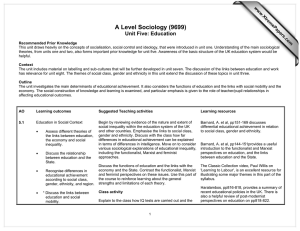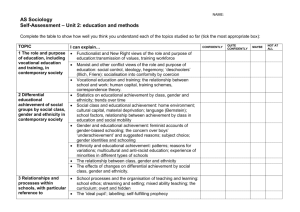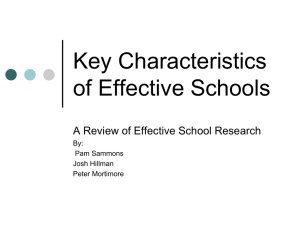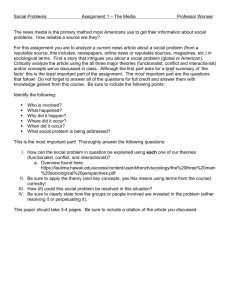www.studyguide.pk A Level Sociology (9699) Unit Five: Education
advertisement
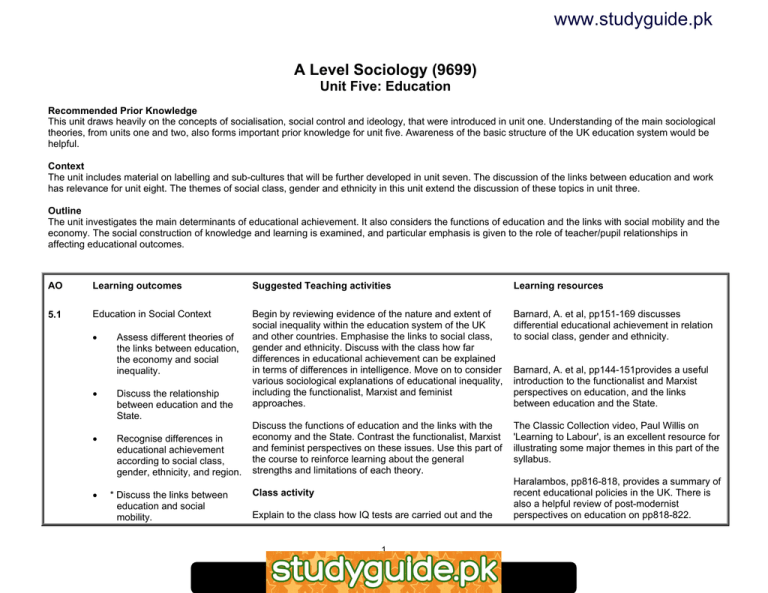
www.studyguide.pk A Level Sociology (9699) Unit Five: Education Recommended Prior Knowledge This unit draws heavily on the concepts of socialisation, social control and ideology, that were introduced in unit one. Understanding of the main sociological theories, from units one and two, also forms important prior knowledge for unit five. Awareness of the basic structure of the UK education system would be helpful. Context The unit includes material on labelling and sub-cultures that will be further developed in unit seven. The discussion of the links between education and work has relevance for unit eight. The themes of social class, gender and ethnicity in this unit extend the discussion of these topics in unit three. Outline The unit investigates the main determinants of educational achievement. It also considers the functions of education and the links with social mobility and the economy. The social construction of knowledge and learning is examined, and particular emphasis is given to the role of teacher/pupil relationships in affecting educational outcomes. AO Learning outcomes Suggested Teaching activities Learning resources 5.1 Education in Social Context Begin by reviewing evidence of the nature and extent of social inequality within the education system of the UK and other countries. Emphasise the links to social class, gender and ethnicity. Discuss with the class how far differences in educational achievement can be explained in terms of differences in intelligence. Move on to consider various sociological explanations of educational inequality, including the functionalist, Marxist and feminist approaches. Barnard, A. et al, pp151-169 discusses differential educational achievement in relation to social class, gender and ethnicity. Discuss the functions of education and the links with the economy and the State. Contrast the functionalist, Marxist and feminist perspectives on these issues. Use this part of the course to reinforce learning about the general strengths and limitations of each theory. The Classic Collection video, Paul Willis on 'Learning to Labour', is an excellent resource for illustrating some major themes in this part of the syllabus. • • • • Assess different theories of the links between education, the economy and social inequality. Discuss the relationship between education and the State. Recognise differences in educational achievement according to social class, gender, ethnicity, and region. * Discuss the links between education and social mobility. Class activity Explain to the class how IQ tests are carried out and the 1 www.xtremepapers.net Barnard, A. et al, pp144-151provides a useful introduction to the functionalist and Marxist perspectives on education, and the links between education and the State. Haralambos, pp816-818, provides a summary of recent educational policies in the UK. There is also a helpful review of post-modernist perspectives on education on pp818-822. www.studyguide.pk AO Learning outcomes Suggested Teaching activities Learning resources purposes they are designed to serve. Then invite the group to make criticisms of the effectiveness of such a test in measuring intelligence. Consider, in particular, the social factors that may influence the outcome of IQ tests and widen the debate to reflect on how educational achievement can be measured and whether conventional forms of assessment, such as public examinations, generate outcomes that are a fair reflection of the individual ability of each student. A useful site for researching the history of education in the UK is: www.eng.umu.se/education Up-to-date information about developments affecting the UK education system can be found at: www.education.guardian.co.uk Two sources of statistical information about gender and education are: www.standards.dfes.gov.uk/genderunderachiev ement www.le.ac.uk/education Information about ethnicity and educational achievement can be found at: www.standards.dfes.gov.uk/ethnicminorities 5.2 Structures and Processes within Schools • Discuss the social construction of knowledge and learning. • Recognise the links between language, deprivation and learning. • Assess the contribution of teacher/pupil relationships to educational achievement. Provide examples to illustrate the social construction of knowledge and learning. Draw on the work of writers such as Illich, Bourdieu, Althusser and Bernstein to show how social factors influence the content of the curriculum and what is defined as knowledge in the context of education. Now discuss the interactionist perspective as a further contribution to the debate about what factors influence educational achievement. Focus on teacher/pupil relationships and explain the concepts of streaming, labelling and the hidden curriculum. Conclude by reviewing work on pupil sub-cultures and attitudes to education. Class activity 2 www.xtremepapers.net Barnard, A et al., pp158-164, focuses on the contribution of the interactionist perspective to the study of educational achievement. www.studyguide.pk AO Learning outcomes • Describe studies of pupil subcultures. Suggested Teaching activities Invite different members of the class to research and give a presentation on the extent to which key concepts in the Sociology of Education (e.g. streaming, labelling, language codes, cultural capital, the hidden curriculum, educational underachievement) are helpful in understanding the education system in their own country. Ask the students to reflect on the usefulness of one concept each. 3 www.xtremepapers.net Learning resources
